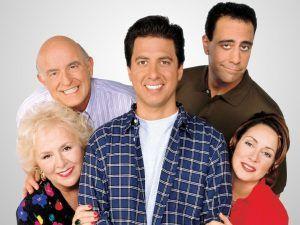Podcast: Play in new window | Download (Duration: 46:32 — 42.6MB)
Subscribe: Apple Podcasts | Spotify | iHeartRadio | Email | RSS | More
“We can complain because rose bushes have thorns, or rejoice because thorns have roses.” ― A Tour Round My Garden
 Season 1, episode 18 of Everybody Loves Raymond was entitled, “Recovering Pessimist.” Debra, Ray’s wife, urges him to be more positive after he remains sour post winning Sportswriter of the Year. He enters their bedroom with an enormous trophy that accompanied the award and utters the line, “It has to be too good to be true.” Reluctantly, Ray tries to change his natural negative outlook, but his family, ever the Negative Nellies, influence him with their usual lackluster enthusiasm for life. Always at the ready to throw cold water on any good news, Ray’s parents thrive on constantly putting people down, including each other!
Season 1, episode 18 of Everybody Loves Raymond was entitled, “Recovering Pessimist.” Debra, Ray’s wife, urges him to be more positive after he remains sour post winning Sportswriter of the Year. He enters their bedroom with an enormous trophy that accompanied the award and utters the line, “It has to be too good to be true.” Reluctantly, Ray tries to change his natural negative outlook, but his family, ever the Negative Nellies, influence him with their usual lackluster enthusiasm for life. Always at the ready to throw cold water on any good news, Ray’s parents thrive on constantly putting people down, including each other!
The newspaper where Ray works promote him after the award. He’s working hard to become an optimist, but it just doesn’t seem to be working until he returns home to the news that his boss wants him to cover the Iditarod in Alaska. A smile breaks out on his face and his wife asks him why he’s smiling. “Cause I’m back. I’m a pessimist and I’m back!” 😉
Ray so identifies as a pessimist, he’s unhappy being anything else. It’s easier for him to automatically think of the worst instead of the best. To give a negative connotation to what could otherwise be a good thing. Raymond is like all those people who enjoy being miserable.
“The man who is a pessimist before 48 knows too much; if he is an optimist after it he knows too little.” ―
Do you overestimate the likelihood of worst-case scenarios coming true?
Twain’s quote is interesting because, for some reason, he focused on a very specific age – 48. I was reading a number of journals dealing with mental health and noticed a focus on people between 18 and 35, based largely on the brain development of the pre-frontal cortex. There’s also lots of talk (and writing) about our ancient brains being wired to keep us safe. Many theorists love to think about us being on the constant lookout for wooly mammoths and other pre-historic villains. These same folks think the earth is billions of years old. Never mind that the Bible chronology would date the earth closer to 6,000 years old.
Last time I looked, our modern culture has plenty of dangers – likely as many, if not more, than our fabled pre-historic counterparts. Our “worst-case scenario” thinking prevents us from making foolish choices. Sometimes.
Browse through YouTube and sooner than later you’ll encounter some videos (there are entire channels devoted to this) where police behave poorly. In almost every video I’ve watched, some officers escalated the situation rather than de-escalating it. That’s what we do with our “worst-case scenario” thinking. We sometimes escalate it rather than choosing to DE-escalate it. The outcome is never as good as it may have been if only we had chosen to ramp things down – not up.
Why would a police officer amp up a situation? Well, it depends. I’ve watched a video of officers who pull over a group of motorcyclists who have been racing through traffic, popping wheelies, and creating some extremely dangerous situations. A supervising officer amps things up by going off on the cyclists, lecturing them on the havoc they’ve caused. He’s angry. He likely knows how awful this thing could have turned out if his officers hadn’t successfully pulled these guys over. He’s making a point and I get it.
On the flip side is another video where officers approach a man minding his own business. If we can believe what we’re told about this encounter, the man did nothing to provoke the police, but they’re suspicious of him. He provides identification but refuses to allow them to search his vehicle. He recites his rights and his video irks the officer. Repeatedly the officer demands he turn it off, but he continues, repeating his rights. The officer gets angrier and more animated in his movements and language. I watch wondering they this officer doesn’t just make a report and let this thing go. But we have no way of knowing exactly what may have happened that we don’t see – or what may have just happened with this officer earlier. Or maybe he’s just an angry cop with an attitude. By the way, I’ve known accountants who were angry with their attitudes. And salespeople. And engineers. And just about every other role you can find in any workplace.
But we watch these videos and we can instantly think de-escalation would be better!
Then why can’t we apply that logic to our own lives? In how we think, “Well, this is too good to be true!”
Because self-control is hard. For cops. For accountants. For engineers. For you and for me. Restraint, especially in our thoughts is very difficult.
A police officer trained to be on guard, always alert to what can go wrong, can hardly be blamed for approaching every traffic stop alert to the possibility that this person they’ve pulled over is a bad, bad guy. We’d think them foolish if they didn’t. But once it’s evident that this is just an ordinary person going about their business, guilty of a minor traffic violation, should they keep their hand on their holster? Should they escalate matters with salty language, demanding the driver step out of the car? Probably not, but it happens. Just like it happens that sometimes we don’t curb ourselves when that would likely be a better option.
Assumptions, paranoia, and fear that things will go south abound. Mostly, those are default feelings and beliefs held by many. We commonly refer to Mr. Murphy whose laws we believe to be true. But who determined they were laws at all? Murphy? Who was he to decide?
What can go wrong, will go wrong.
It’s one thing to understand that it’s possible, but it’s something else to believe it will happen. And every time. Truth is, there are lots of things that could go wrong but never do. Or rarely do. Just think of all the time you spend behind the wheel of your car without incident. Or the times we spend doing anything – shopping, sleeping, going about our business, playing, recreating – without anything bad happening. The outliers don’t define us. They certainly don’t prove it’s a law!
Bias corrupts all of us. You hear it in daily conversation whenever you – or somebody else – use terms like “everybody” or “always.”
“That always happens.”
“Everybody thinks so.”
We know that’s not true, but we spout off like it is. It’s a rampant communication weakness formed, in part, from our biases. Trump haters jumped on every word. Biden lovers ignore the apparent cognitive weaknesses. Trump lovers hear one thing while haters hear something completely different. Biden endures the same thing. Meanwhile, our biases risk deepening, blinding us even more to reality.
What is cognitive bias?
According to TechTarget.com –
Cognitive bias is a systematic thought process caused by the tendency of the human brain to simplify information processing through a filter of personal experience and preferences. The filtering process is a coping mechanism that enables the brain to prioritize and process large amounts of information quickly.
They list a number of types of cognitive biases. I suppose there are new ones being identified regularly.
“Too good to be true” speaks to our biases, but it also speaks to our beliefs and feelings. It’s much deeper than optimism and pessimism.
Right now we’re in the middle of election campaigning. I’m hearing political ads daily, especially for the governor. There’s an incumbent and an opposed. The incumbent is a long-standing conservative. The opponent is a long-standing liberal. Both are regularly slamming their opponent with 3 second sound bites that make their opponent sound like the Devil, supportive of anything vile and evil. Me? I don’t trust either one. 😀
For our state or any state, or our nation for that matter to find a great leader that can truly help our country? Well, that just may be too good to be true. 😀
Learning optimism is difficult in part because we’re surrounded by negativity. Pessimism is easy. It doesn’t require much effort to see how something could go badly. And we reason that if we’ll keep our expectations low, then we’ll reduce our disappointment. Yet, we’re constantly experiencing disappointments.
All the songs about suffering, hardship, and disappointment resonate with us. Universally. For some, much more so than any songs of joy, happiness or even contentment.
It’s hard to choose optimism. But pessimism is harder.

Please tell a friend about the podcast!
